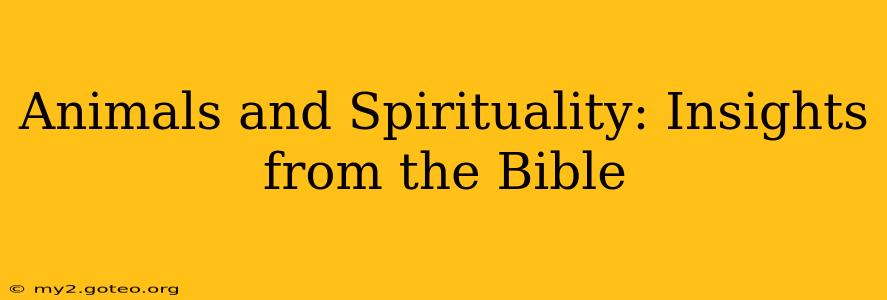The Bible, a rich tapestry of narratives and teachings, offers profound insights into the relationship between humans and animals, revealing a complex spiritual connection often overlooked. From majestic creatures symbolizing divine power to humble animals representing humanity's vulnerability, the biblical portrayal of animals extends far beyond simple observation, weaving a narrative that speaks to our spiritual understanding of creation, responsibility, and the divine.
What role do animals play in the Bible?
Animals play a multifaceted role throughout the Bible, serving as symbols, metaphors, and even active participants in the unfolding of God's plan. Their presence reflects the creator's wisdom, power, and love. Consider the majestic lion, often representing strength, royalty, and even God's own sovereignty (Revelation 5:5). Conversely, the lamb frequently symbolizes innocence, sacrifice, and ultimately, Jesus Christ (John 1:29). The diversity of animal imagery emphasizes the richness and complexity of God's creation, highlighting the intricate balance within the natural world.
What are some examples of symbolic animals in the Bible?
Numerous animals hold significant symbolic weight within the biblical context. The serpent, for example, represents temptation and deception in the Garden of Eden (Genesis 3), while the dove symbolizes peace and the Holy Spirit (Matthew 3:16). The eagle, with its powerful flight, often signifies divine protection and guidance, while the sheep, often portrayed as a flock needing a shepherd, represents humanity's dependence on God's guidance and care. Understanding these symbolic representations enriches our comprehension of the biblical narrative and its deeper spiritual meaning.
How does the Bible teach us to treat animals?
While the Bible doesn't explicitly lay out a detailed code of animal welfare as we understand it today, it underscores a responsibility towards creation. God entrusts humans with dominion over animals (Genesis 1:28), but this dominion is not absolute ownership or license for exploitation. Rather, it implies responsible stewardship and care. The ethical treatment of animals is implied throughout the scriptures, evidenced by God's concern for the well-being of His creation and the frequent use of animals as metaphors for human vulnerability and dependence on divine grace. This understanding fosters a deeper appreciation for the intrinsic value of all living creatures.
What does the Bible say about animal sacrifice?
Animal sacrifice played a significant role in the Old Testament, serving as a crucial aspect of the covenant between God and His people. These sacrifices symbolized atonement for sin and represented a foreshadowing of the ultimate sacrifice of Jesus Christ. While the practice of animal sacrifice is not continued in the New Testament, its historical significance illuminates the concept of substitutionary atonement and the cost of reconciliation with God. The understanding of animal sacrifice in its historical context is essential to grasp the theological significance of Jesus's sacrifice on the cross.
Are animals conscious of God?
The Bible doesn't explicitly address the question of animal consciousness of God in a definitive way. However, the pervasive presence of animals in biblical narratives, their symbolic significance, and God's evident care for all creation suggest a possible connection, albeit one that remains beyond our full comprehension. Whether or not animals possess a spiritual awareness comparable to humans is a matter of ongoing theological discussion and philosophical exploration. However, the biblical emphasis on God's love extending to all His creation invites reflection on the possibility of a deeper connection between animals and the divine.
Conclusion:
The Bible’s portrayal of animals is far richer and more nuanced than a simple inventory of creatures. It offers profound spiritual insights into our relationship with the natural world, reminding us of our responsibility as stewards of creation and emphasizing the interconnectedness of all living beings within God's grand design. By exploring the symbolic significance of animals within the biblical narrative, we gain a deeper understanding of God's character, His plan for humanity, and our place within the wider tapestry of creation. The study of animals in the Bible provides a lens through which to explore both our human relationship with the divine and our responsibility toward all of God's creation.

